
Infectious Diseases of Poverty
Scope & Guideline
Connecting global insights to combat infectious diseases.
Introduction
Aims and Scopes
- Epidemiology of Infectious Diseases:
Research on the incidence, distribution, and control of infectious diseases, particularly those prevalent in low-income regions. - Neglected Tropical Diseases (NTDs):
Focused studies on NTDs, their epidemiology, transmission dynamics, and innovative control strategies, emphasizing the impact of these diseases on impoverished populations. - Impact of Socioeconomic Factors:
Exploration of how socioeconomic status, geographical disparities, and environmental factors influence the prevalence and management of infectious diseases. - One Health Approach:
Integration of human, animal, and environmental health perspectives to address zoonotic diseases and their transmission pathways. - Innovative Interventions and Control Strategies:
Research on new methodologies and frameworks for disease prevention, control, and elimination, including community-based approaches and health system strengthening. - Global Health Policies and Strategies:
Analysis of health policies and their effectiveness in combating infectious diseases, particularly in resource-limited settings.
Trending and Emerging
- Climate Change and Health:
Research examining the impact of climate change on infectious disease transmission is on the rise, highlighting the need to understand how environmental changes affect disease dynamics. - Intersectionality in Health Research:
There is an increasing trend towards integrating gender and socio-economic analysis in health research, recognizing the multifaceted factors influencing health outcomes. - COVID-19 and Infectious Disease Interplay:
Studies exploring the effects of the COVID-19 pandemic on other infectious diseases and health systems are trending, emphasizing the interconnectedness of global health challenges. - Community Engagement and Participation:
Emerging research emphasizes the importance of community involvement in health interventions, recognizing that local insights are crucial for effective disease control strategies. - Digital Health Technologies:
The utilization of digital tools and technologies for disease surveillance, diagnosis, and intervention is becoming more prominent as researchers seek innovative solutions to health challenges.
Declining or Waning
- Traditional Epidemiological Studies:
There is a noticeable decrease in purely descriptive epidemiological studies without innovative interventions or policy implications, likely due to a shift towards more applied research. - Single-Disease Focus:
Research focusing exclusively on single diseases, without consideration of co-infections or the broader context of health systems, seems to be less prevalent as interdisciplinary approaches gain traction. - Local Case Studies:
While local case studies have provided valuable insights, there has been a decline in their frequency as researchers increasingly prioritize global or regional analyses that can inform broader health strategies. - Basic Laboratory Research:
Basic laboratory studies with limited application to field settings are becoming less common as there is a growing demand for research that directly informs public health practice and policy. - Static Policy Analysis:
Static analyses of health policies without robust evaluation frameworks are waning, as there is a stronger emphasis on dynamic, evidence-based policy evaluation and adaptation.
Similar Journals
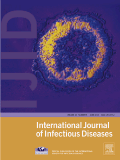
INTERNATIONAL JOURNAL OF INFECTIOUS DISEASES
Innovating solutions for infectious disease challenges.INTERNATIONAL JOURNAL OF INFECTIOUS DISEASES, published by ELSEVIER SCI LTD, stands as a leading platform in the realm of infectious diseases, contributing significantly to the global understanding of this critical field. With an impressive impact factor, the journal maintains a distinguished Q1 ranking across various categories, including Infectious Diseases, Medicine (miscellaneous), and Medical Microbiology, demonstrating its high relevance and influence among contemporary research. Since its inception in 1996, it has embraced an Open Access model, allowing for wider dissemination of essential research findings that can inform public health policies and clinical practices. With a commitment to advancing scientific knowledge, this journal is not only a vital resource for researchers and professionals but also serves as an invaluable educational tool for students interested in the complexities of infectious diseases and their management. For those looking to stay at the forefront of research and innovation in this field, the INTERNATIONAL JOURNAL OF INFECTIOUS DISEASES is an indispensable resource.
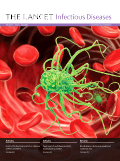
LANCET INFECTIOUS DISEASES
Advancing the Frontiers of Infectious Disease ResearchLANCET INFECTIOUS DISEASES is a premier journal published by Elsevier Science Ltd, dedicated to disseminating high-quality research and comprehensive reviews in the field of infectious diseases. Since its inception in 2001, the journal has become a pivotal resource in the medical community, recognized for its rigorous peer-review process and impactful contributions to public health. With an impressive Scopus rank of #2 out of 344 in the category of Medicine - Infectious Diseases, it consistently ranks in the 99th percentile, highlighting its importance and influence in shaping clinical and epidemiological research. The journal's commitment to advancing knowledge in infectious diseases is underscored by its Q1 quartile designation in 2023, affirming its status as a leading academic outlet. Although not an open-access journal, LANCET INFECTIOUS DISEASES provides essential insights for researchers, healthcare professionals, and students, bridging the gap between cutting-edge research and practical application in an increasingly interconnected world.

Infectious Diseases and Clinical Microbiology
Exploring the frontiers of microbiological science and health.Infectious Diseases and Clinical Microbiology is a pivotal journal dedicated to advancing our understanding of infectious diseases through rigorous scientific research and clinical practices. Published by DOC DESIGN INFORMATICS CO LTD, this journal serves as a vital platform for researchers, healthcare professionals, and students keen on enhancing their knowledge of microbiological sciences and the clinical implications of infectious agents. With an ISSN of 2667-646X, it aims to disseminate significant findings in the field, enriching the scholarly dialogue surrounding infectious diseases. While currently operating under a traditional access model, the journal encourages global collaboration and knowledge sharing, striving to make a meaningful impact in tackling the challenges posed by infectious diseases. Its content aims to bridge the gap between laboratory research and clinical application, making it an essential resource in the contemporary landscape of global health.
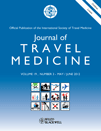
JOURNAL OF TRAVEL MEDICINE
Uncovering Innovations in Travel MedicineJOURNAL OF TRAVEL MEDICINE, published by Oxford University Press Inc, is a preeminent scholarly journal dedicated to the field of travel medicine. With an impressive impact factor and a remarkable ranking in the Q1 category across multiple disciplines including Infectious Diseases, Public Health, and Environmental and Occupational Health, this journal is pivotal for researchers, healthcare professionals, and students interested in the complexities of health risks associated with global travel. It has maintained its rigorous academic standards since its inception in 1994, continuing to serve as a vital resource and platform for disseminating innovative research, case studies, and reviews that address emerging challenges in travel health. With a strong commitment to advancing public health knowledge, the JOURNAL OF TRAVEL MEDICINE fosters dialogue and collaboration among the global research community and contributes significantly to evidence-based practices in the field. For those interested in cutting-edge findings and developments, this journal remains an essential source of information and guidance.
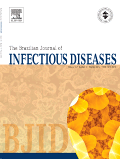
Brazilian Journal of Infectious Diseases
Elevating the discourse on infectious diseases globally.The Brazilian Journal of Infectious Diseases, published by Elsevier Brazil, is a premier open-access journal dedicated to advancing research and clinical practice in the field of infectious diseases. Since its inception in 2001, this journal has been pivotal in disseminating innovative studies and reviews that inform healthcare professionals and researchers alike. With an impressive impact factor reflected by its ranking in the second quartile for Infectious Diseases and third quartile for Medical Microbiology in 2023, the journal ranks #127 out of 344 in medicine – infectious diseases and #61 out of 140 in medical microbiology, showcasing its reputable standing in the scientific community. The Brazilian Journal of Infectious Diseases invites contributions that highlight significant findings, novel methodologies, and critical reviews aimed at enhancing patient care and public health initiatives. With an international readership and a focus on pressing issues in infectious diseases, it serves as an essential platform for knowledge exchange and collaboration among scholars and practitioners across Brazil and beyond. By reinforcing the importance of open access to scientific literature, this journal not only promotes transparency but also enhances the global discourse surrounding infectious diseases.

Biosafety and Health
Advancing global health through rigorous research.Biosafety and Health is a leading peer-reviewed journal published by ELSEVIER, dedicated to advancing knowledge and practice in the fields of biotechnology, infectious diseases, microbiology, and public health. With an ISSN of 2096-6962 and an E-ISSN of 2590-0536, this Open Access journal has been accessible to the global research community since 2019, fostering collaboration and innovation from its base in the Netherlands. Ranked Q2 in multiple categories according to the latest metrics, including Biotechnology and Microbiology (medical), it stands as a testament to high-quality, impactful research that influences clinical and environmental practices. The journal has achieved substantial recognition in various medical fields, ranking in the 88th percentile for Public Health, Environmental and Occupational Health, and the 78th percentile for Infectious Diseases. Researchers and practitioners seeking to contribute to this evolving domain are encouraged to submit their findings, as the journal aims to promote interdisciplinary dialogue and address pressing global health challenges.
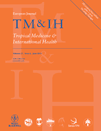
TROPICAL MEDICINE & INTERNATIONAL HEALTH
Bridging knowledge gaps in tropical medicine.Tropical Medicine & International Health is a distinguished journal published by Wiley, dedicated to the exploration and dissemination of cutting-edge research in the fields of infectious diseases, parasitology, and public health. With a robust open-access option, the journal facilitates the widespread sharing of information critical to addressing health issues in tropical and international settings. Since its inception in 1996, it has established a significant presence in the academic community, as indicated by its impressive ranking in various Scopus categories, notably positioned in the Q1 quartile for Parasitology and Q2 for both Infectious Diseases and Public Health, reflecting its high influence within these domains. The journal's commitment to advancing knowledge on health challenges prevalent in tropical environments makes it an invaluable resource for researchers, healthcare professionals, and students alike who are dedicated to improving global health outcomes.
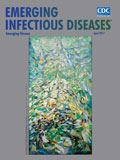
EMERGING INFECTIOUS DISEASES
Exploring Innovations in Infectious Disease ManagementEmerging Infectious Diseases, published by the Centers for Disease Control and Prevention, is a leading open-access journal that has been dedicated to the field of epidemiology, infectious diseases, and medical microbiology since its inception in 1995. With an impressive impact factor placing it in the Q1 quartile rankings for multiple categories including Epidemiology, Infectious Diseases, and Medical Microbiology, this journal serves as a vital resource for researchers, practitioners, and students dedicated to combating the challenges posed by emerging infectious diseases. The journal's distinguished Scopus ranks further highlight its global influence, ranking #10 in Epidemiology, #26 in Infectious Diseases, and #13 in Medical Microbiology, all within the top percentiles. Accessible and targeted, Emerging Infectious Diseases publishes seminal research and reviews that contribute to the understanding and management of infectious diseases, ensuring that critical insights reach a broad audience. The journal encourages contributions that advance the scientific community’s knowledge and responses to public health challenges.
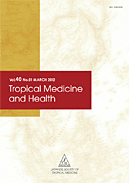
Tropical Medicine and Health
Fostering collaboration for better health outcomes in the tropics.Tropical Medicine and Health is a prestigious open-access journal published by BMC that serves as a vital platform for researchers and health professionals focusing on the fields of tropical medicine, infectious diseases, and public health. With an ISSN of 1348-8945 and an E-ISSN of 1349-4147, the journal has established itself in the academic community since its inception in 2004, bridging the gap between research and real-world applications in managing tropical diseases. Recognized for its quality, it holds a commendable Q2 ranking in both the Infectious Diseases and Public Health, Environmental and Occupational Health categories, positioned in the 2023 Scopus rankings within the 85th and 74th percentiles, respectively. Researchers can access high-quality, peer-reviewed articles that contribute significantly to advancing knowledge in the field. With a commitment to fostering open scientific dialogue, Tropical Medicine and Health is not just a journal, but a collaborative space for researchers, students, and practitioners working to improve health outcomes in tropical regions worldwide.

Journal of Pathogens
Pioneering Discoveries in Microbial ScienceJournal of Pathogens is a premier peer-reviewed journal published by HINDAWI LTD, focusing on the critical field of microbiology, infectious diseases, and the mechanisms of pathogen interactions with hosts. Since its inception in 2011 as an Open Access journal, it has aimed to provide a platform for high-quality research articles, reviews, and case studies that enhance our understanding of pathogenesis and advance the science of disease control. With its commitment to making research freely accessible, the journal attracts a global audience of researchers, professionals, and graduate students keen on exploring innovative findings and applications in the study of pathogens. While the journal does not currently have an established H-index or category quartiles, its relevance and importance in the field continue to grow as it seeks to bridge knowledge gaps and facilitate impactful discussions in infectious disease research. Located at Adam House, 3rd Floor, 1 Fitzroy Square, London W1T 5HF, England, the Journal of Pathogens invites submissions that contribute to the ever-evolving landscape of pathogen research and public health.